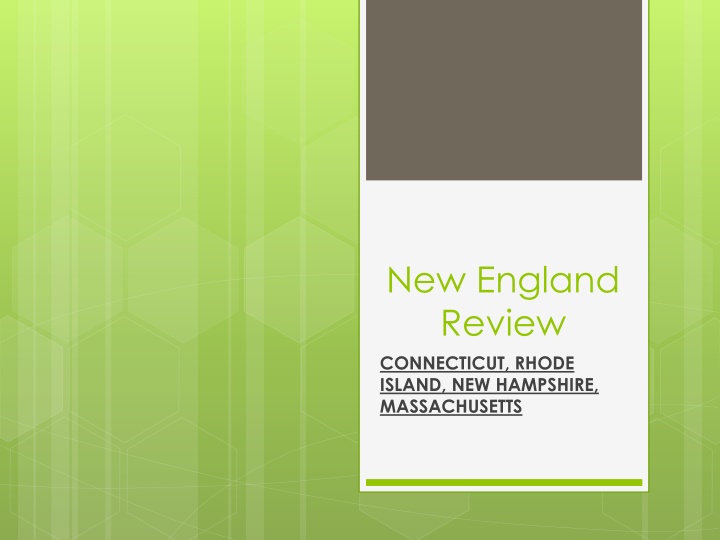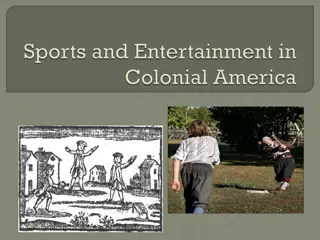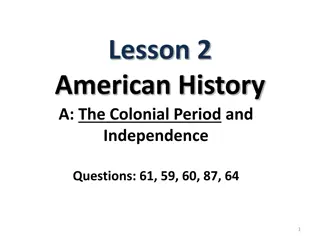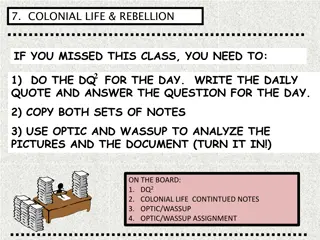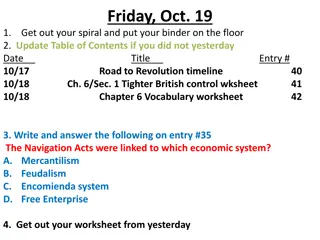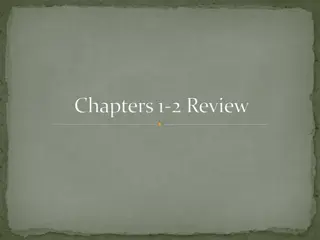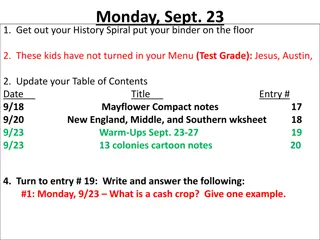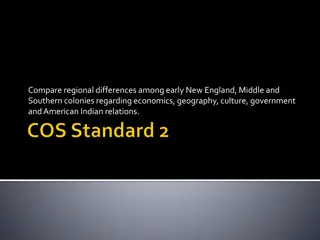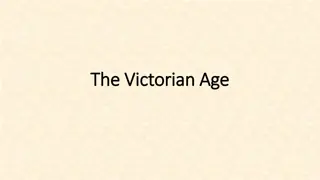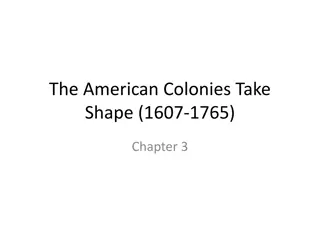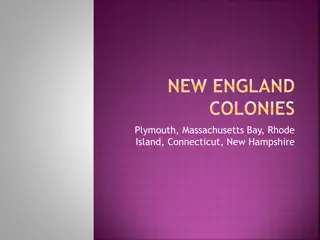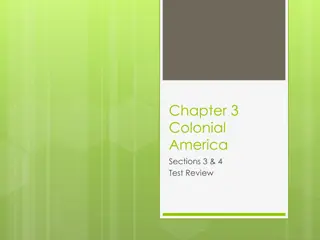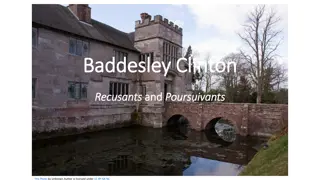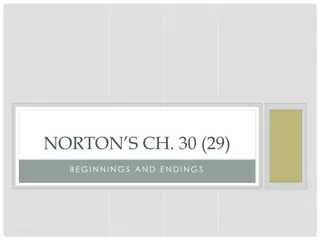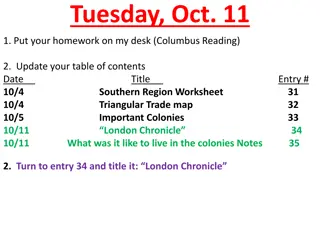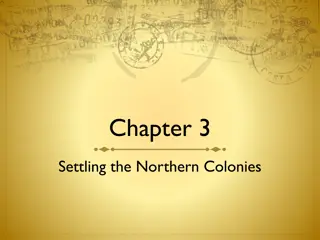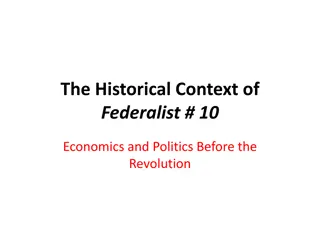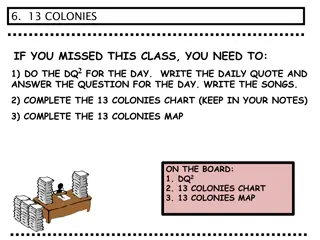Colonial Beginnings in New England and the Middle Colonies
The colonial origins of Connecticut, Rhode Island, New Hampshire, Massachusetts, New York, New Jersey, Pennsylvania, and Delaware are explored, including key figures like Roger Williams and Thomas Hooker, and pivotal events such as the Salem Witch Trials. Learn about the Mayflower Compact, Fundamental Orders of Connecticut, and the unique characteristics of each colony, from religious tolerance to self-governing structures.
Download Presentation

Please find below an Image/Link to download the presentation.
The content on the website is provided AS IS for your information and personal use only. It may not be sold, licensed, or shared on other websites without obtaining consent from the author.If you encounter any issues during the download, it is possible that the publisher has removed the file from their server.
You are allowed to download the files provided on this website for personal or commercial use, subject to the condition that they are used lawfully. All files are the property of their respective owners.
The content on the website is provided AS IS for your information and personal use only. It may not be sold, licensed, or shared on other websites without obtaining consent from the author.
E N D
Presentation Transcript
New England Review CONNECTICUT, RHODE ISLAND, NEW HAMPSHIRE, MASSACHUSETTS
Massachusetts ~Pilgrims: Separatists left for freedom of religion ~Mayflower Compact: Agreement of colonists Self government/written form of government ~Puritans: Simplify Church of England; Wanted to have religious freedom (government and religion as one)
Connecticut ~Thomas Hooker is founder of CT who left for religious freedom and political freedom ~Fundamental Orders of Connecticut: A document that Limit government power Focused specifically on the governor trying to make it more balanced
Rhode Island ~Roger Williams: Founder of RI; Religious Tolerance and Separation of Church and State
New England Experiences ~Salem Witch Trials: event that was the catalyst for Separation of Church and State and the right to a fair trial ~Mayflower Compact-self-governing ~Fundamental orders of CT-Limiting government: led to the idea of Constitution to limit power of government ~Rhode Island: Relg. Freedom: strict rules of church and state and governor too much power leads to religious toleration
Middle Colony Review NEW YORK, NEW JERSEY, PENNSYLVANIA, DELAWARE
New York ~New Amsterdam; New Netherlands/Dutch England sent in warships and laid siege on Peter Stuyvesant Cultural Mix Religious freedom; economic ~Proprietary colony: King gives land to one or more people who make laws for colony but under English Law
New Jersey ~Royal colony: under control of English Crown ~Cultural Diversity from all over Europe
Delaware ~Settlers in lower PA. counties felt it was too far to send delegates to assembly in PA
Pennsylvania ~Holy Experiment: peace & rel. freedom/tolerance ( belief system -Rel. freedom, peace, Christianity); Wanted religious freedom; believe in equality, anti- war, anti-slavery ~Open Door Policy-Believed in policy of fairness to allow all groups the opportunity of fertile land & new life Penn sent pamphlets describing colony all over Europe (Scotland, England, Wales, Netherlands, Ireland, Germany) *many come from all over
Middle Colony Experiences ~Elected Assembly: Principle I-People Rule: Self- Government, Town meetings, voting-elected government; right to assemble ~William Penn: Letter Writing Campaign & Open Door Policy: Values: Religious tolerance: Separation of Church & State; Cultural Diversity & equality; Fairness with Native Americans & Anti-Slavery movements; Women s rights ~William Penn: Holy Experiment Freedom, Peace, Christian Living
Southern Colony Review MARYLAND, VIRGINIA, THE CAROLINAS, GEORGIA
Maryland ~Religious Toleration: Act of Toleration = Religious toleration for Christians Amend. 1 ~Mason-Dixon Line: 1767 divided the middle and southern life (Stone markers with P & M indicating borders between PA & MD) Division between North and South
Virginia ~House of Representatives; assembly. Not all could vote: women, non-whites, people who did not own property Representative democracy ~Nathanial Bacon: Fights with Native Americans over . The settlers called on the governor to take action against the Natives but he refused Bacon and other farmers gathered and raided Native American villages and Jamestown (burned it down). Short revolt in which 23 of Bacon s followers were hung. However : example of challenge authority/government when the government doesn t do its job (to protect its citizen s).
The Carolinas ~Economic Growth: crops of tobacco, rice and indigo (blue dye) grew real well in these areas ~Indigo: Blue dye. Economic success-- Rice and Indigo grew well in the areas and became a very valuable crop
Georgia ~Debtor Colony pay debt in England in return farm land (indentured servant) ~Buffer Colony: State between Spanish Florida and the English Carolinas keep the peace
Two Ways of Life Backcountry: west-hardships; more democratic and equal; not many slaves; traveled Great Wagon Rd. Vs. Tidewater Plantations: Along rivers & creeks of coastal plain: area offered rich soil and easy access to move goods (wealthiest plantations)
Two Ways of Life ~Slave codes treated enslaved Africans not as human beings but as property. These laws set out rules for slaves behavior and denied slaves basic rights
Southern Colony Experiences ~Slavery-Slave Codes-racism still exists (laws implement to stop this) ~Mason-Dixon Line (division of North & South) ~Cultural Diversity ~House of Burgesses: Representative Government ~Maryland s Act of Toleration: Document free exercise of --Religious freedom- Amendment 1 ~Land: Economic Freedom (cash crops) ~Bacon s Rebellion (challenge authority) ~Maryland women own land: Social Change
